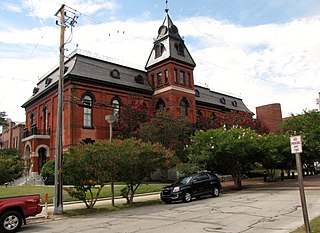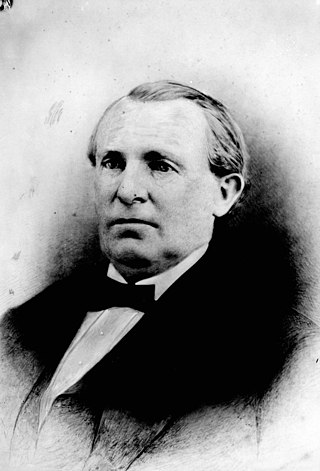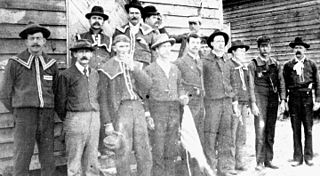Related Research Articles

Craven County is a county located in the U.S. state of North Carolina. As of the 2020 census, the population was 100,720. Its county seat is New Bern. The county was created in 1705 as Archdale Precinct from the now-extinct Bath County. It was renamed Craven Precinct in 1712 and gained county status in 1739. It is named for William, Earl of Craven, who lived from 1606 to 1697. Craven County is part of the New Bern, NC Micropolitan Statistical Area.

Daniel Lindsay Russell Jr. was an American politician who served as the 49th governor of North Carolina, from 1897 to 1901. An attorney and judge, he had also been elected as state representative and to the United States Congress, serving from 1879 to 1881. Although he fought with the Confederacy during the Civil War, Russell and his father were both Unionists. After the war, Russell joined the Republican Party in North Carolina, which was an unusual affiliation for one of the planter class. In the postwar period he served as a state judge, as well as in the state and national legislatures.

Curtis Hooks Brogden was an American farmer, attorney and politician who served as the 42nd governor of the U.S. state of North Carolina from 1874 to 1877 during the Reconstruction era. He succeeded to the position after the death of Governor Tod R. Caldwell, after having been elected as the 2nd lieutenant governor of the state on the Republican ticket in 1872.

John Adams Hyman was a U.S. Congressman from North Carolina from 1875 to 1877. A Republican, he was the first African American to represent the state in the House of Representatives. He was elected from North Carolina's 2nd congressional district, including counties in the northeast around New Bern. Earlier he served in the North Carolina Senate.

George Henry White was an American attorney and politician, elected as a Republican U.S. Congressman from North Carolina's 2nd congressional district between 1897 and 1901. He later became a banker in Philadelphia, Pennsylvania and in Whitesboro, New Jersey, an African-American community he co-founded. White was the last African-American Congressman during the beginning of the Jim Crow era and the only African American to serve in Congress during his tenure.

Joseph Maull Carey was an American lawyer, rancher, judge, and politician, who was active in Wyoming local, state, and federal politics.

James Edward O'Hara was an American politician and attorney who in 1882, after Reconstruction, was the second African American to be elected to Congress from North Carolina. He was born in New York City to parents of mixed-race West Indian and Irish ancestry and was raised in the West Indies. As a young man, he traveled to the southern United States after the American Civil War with religious missionaries from the African Methodist Episcopal Zion Church, an independent black denomination, to help freedmen establish independent lives and new congregations. O'Hara became active in politics, being elected as a Republican to local and state offices.

The Red Shirts or Redshirts of the Southern United States were white supremacist paramilitary terrorist groups that were active in the late 19th century in the last years of, and after the end of, the Reconstruction era of the United States. Red Shirt groups originated in Mississippi in 1875, when anti-Reconstruction private terror units adopted red shirts to make themselves more visible and threatening to Southern Republicans, both whites and freedmen. Similar groups in the Carolinas also adopted red shirts.

Charles Randolph Thomas, son of Charles R. Thomas (1827-1891), was a North Carolina attorney and politician. Like his father, he served as a U.S. Representative in Congress from North Carolina. Whereas his father had joined the Republican Party after the American Civil War, the younger Charles Thomas was a Democrat.

John Hickman was a Republican, Democratic and Anti-Lecompton Democratic member of the U.S. House of Representatives for Pennsylvania's 6th congressional district from 1855 to 1863.

David Moffatt Furches was an American politician and jurist who served as an associate justice (1895–1901) and chief justice (1901–1903) of the North Carolina Supreme Court.
Statesville Record & Landmark is an American, English language daily newspaper based in Statesville, North Carolina. The newspaper is owned by Lee Enterprises. The Statesville Record & Landmark is the newspaper of record for Statesville and has been serving the city and Iredell County, North Carolina since June 19, 1874 when it was a weekly called the Landmark. It has been published seven days a week since 1920.
Israel B. Abbott was a politician from North Carolina who served in the North Carolina House of Representatives in 1872 during the Reconstruction era. He was African American.

Smith Mead Weed was a Democratic lawyer and businessman from Plattsburgh, New York, who served as a member of the New York State Assembly from 1865 to 1867, in 1871, and again in 1873 and 1874.
Simeon Farr was an American politician who was elected as a state representative in 1868 in South Carolina during the Reconstruction era. He represented Union County, South Carolina. His photograph was used in a composite of Radical Republican officials from South Carolina. His name is spelled Simon Farr in an 1868 House document.

An election was held on November 8, 2022, to elect all 50 members to North Carolina's Senate. The election coincided with the elections for other offices, including the U.S. Senate, U.S. House of Representatives, and state house. The filing period lasted from February 24, 2022, to March 4, 2022, with the primary election being held on May 17, 2022. The elections were originally to be held under new districts passed by the General Assembly in Senate Bill 739 to account for population changes following the 2020 census; however, following a ruling by the North Carolina Supreme Court, the General Assembly redrew the maps to comply with the court's ruling.
William D. Claypool was an Arizona politician who served several terms in the Arizona State Senate during the 1910s and 1920s.
James H. Alston was an American state legislator in Alabama. He served in the legislature in 1868 and from 1869 to 1879.
Richard Tucker was a carpenter, undertaker, and state legislator in North Carolina. He represented Craven County in the North Carolina House of Representatives in 1870 and in the North Carolina Senate in 1874 during the Reconstruction era. In 1874 he was one of four African Americans in the North Carolina Senate, all Republicans. The North Carolina House had 13 African Americans. Both bodies had strong Democratic Party majorities during the session.
References
- 1 2 Justesen, Benjamin R. (July 2, 2012). George Henry White: An Even Chance in the Race of Life. LSU Press. p. 106. ISBN 9780807144770 – via Google Books.
- ↑ Work, Monroe N.; Staples, Thomas S.; Wallace, H.A.; Miller, Kelly; McKinlay, Whitefield; Lacy, Samuel E.; Smith, R.L.; McIlwaine, H.R. (January 1920). "Some Negro Members of Reconstruction Conventions and Legislatures and of Congress". The Journal of Negro History . 5 (1): 77. doi:10.2307/2713503. JSTOR 2713503 .
- ↑ "The North Carolina Legislature - 1885". The Charlotte Democrat. Charlotte, North Carolina. 1884-12-26. p. 2. Retrieved 2023-01-23– via Newspapers.com.
- 1 2 "The General Assembly". The Torchlight. Oxford, North Carolina. 1887-01-11. p. 8. Retrieved 2023-01-23– via Newspapers.com.
- ↑ "House". Statesville Record And Landmark. Statesville, North Carolina. 1887-01-27. p. 3. Retrieved 2023-01-23– via Newspapers.com.
- ↑ "The Craven County Contest". The Weekly Star. Wilmington, North Carolina. 1887-01-28. p. 3. Retrieved 2023-01-23– via Newspapers.com.
- ↑ "Muttered Curses". The North Carolinian. Raleigh, North Carolina. 1896-05-21. p. 11. Retrieved 2023-01-23– via Newspapers.com.
- 1 2 "Well Known Colored Man Died Here Today". The New Bern Sun Journal. New Bern, North Carolina. 1922-11-22. p. 1. Retrieved 2023-01-23– via Newspapers.com.